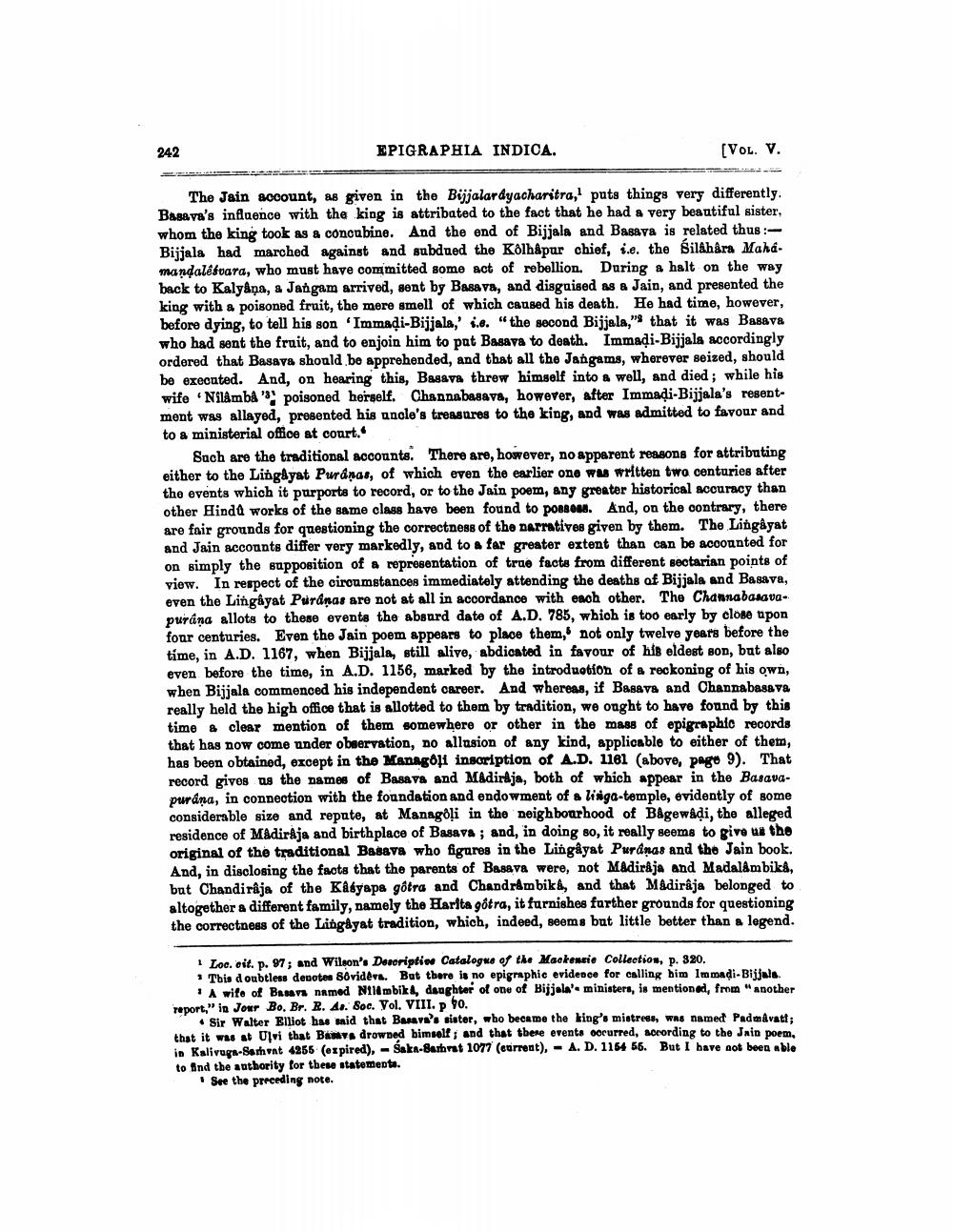________________
242
EPIGRAPHIA INDICA.
[VOL. V.
The Jain account, as given in the Bijjalardyacharitra, puts things very differently. Basava's influence with the king is attributed to the fact that he had a very beautiful sister, whom the king took as a concubine. And the end of Bijjala and Basava is related thus:Bijjala had marched against and subdued the Kolhapur chief, i.e. the Silâhâra Mahamandalêsvara, who must have committed some act of rebellion. During a halt on the way back to Kalyana, a Jangam arrived, sent by Basava, and disguised as a Jain, and presented the king with a poisoned fruit, the mere smell of which caused his death. He had time, however, before dying, to tell his son 'Immadi-Bijjala,' i.e. "the second Bijjala," that it was Basava who had sent the fruit, and to enjoin him to put Basava to death. Immaḍi-Bijjala accordingly ordered that Basava should be apprehended, and that all the Jangams, wherever seized, should be executed. And, on hearing this, Basava threw himself into a well, and died; while his wife Nilamba' poisoned herself. Channabasava, however, after Immaḍi-Bijjala's resentment was allayed, presented his uncle's treasures to the king, and was admitted to favour and to a ministerial office at court.
Such are the traditional accounts. There are, however, no apparent reasons for attributing either to the Lingayat Purdnas, of which even the earlier one was written two centuries after the events which it purports to record, or to the Jain poem, any greater historical accuracy than other Hindu works of the same class have been found to possess. And, on the contrary, there are fair grounds for questioning the correctness of the narratives given by them. The Lingayat and Jain accounts differ very markedly, and to a far greater extent than can be accounted for on simply the supposition of a representation of true facts from different sectarian points of view. In respect of the circumstances immediately attending the deaths of Bijjala and Basava, even the Lingayat Puranas are not at all in accordance with each other. The Channabasavapurana allots to these events the absurd date of A.D. 785, which is too early by close upon four centuries. Even the Jain poem appears to place them, not only twelve years before the tíme, in A.D. 1167, when Bijjala, still alive, abdicated in favour of his eldest son, but also even before the time, in A.D. 1156, marked by the introduction of a reckoning of his own, when Bijjala commenced his independent career. And whereas, if Basava and Channabasava really held the high office that is allotted to them by tradition, we ought to have found by this time a clear mention of them somewhere or other in the mass of epigraphic records that has now come under observation, no allusion of any kind, applicable to either of them, has been obtained, except in the Managoli inscription of A.D. 1161 (above, page 9). That record gives us the names of Basava and Madiraja, both of which appear in the Basavapurána, in connection with the foundation and endowment of a liga-temple, evidently of some considerable size and repute, at Managôli in the neighbourhood of Bågewaḍi, the alleged residence of Madiraja and birthplace of Basava; and, in doing so, it really seems to give us the original of the traditional Basava who figures in the Lingayat Purdnas and the Jain book. And, in disclosing the facts that the parents of Basava were, not Madiraja and Madalambika, but Chandiraja of the Kasyapa gôtra and Chandrâmbika, and that Mâdirâja belonged to altogether a different family, namely the Harita gótra, it furnishes further grounds for questioning the correctness of the Lingayat tradition, which, indeed, seems but little better than a legend.
1 Loc. cit. p. 97; and Wilson's Descriptive Catalogue of the Mackenzie Collection, p. 320.
This doubtless denotes Sovidêva. But there is no epigraphic evidence for calling him Immadi-Bijjala. A wife of Basava named Nilambika, daughter of one of Bijjala' ministers, is mentioned, from "another report," in Jour Bo. Br. R. As. Soc. Vol. VIII. p to.
Sir Walter Elliot has said that Basava's sister, who became the king's mistress, was named Padmavati; that it was at Ulvi that Basava drowned himself; and that there events occurred, according to the Jain poem, in Kalivaga-Sarhvat 4255 (expired), Saka-Samvat 1077 (current), A. D. 1164 55. But I have not been able to find the authority for these statements.
See the preceding note.




